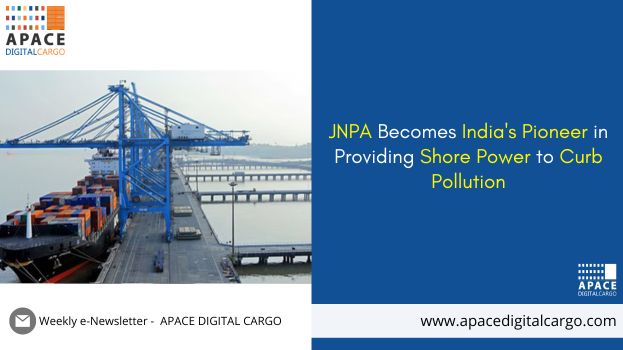
In a groundbreaking initiative for India, the Jawaharlal Nehru Port Authority (JNPA) in Navi Mumbai has set plans to implement shore power supply (SPS) for vessels docking at its terminals by 2030. This INR 100-crore pilot project aims to eliminate the use of diesel by ships while at berth, significantly reducing pollution.
Shore power supply involves providing electricity from the shore to docked ships, allowing them to shut down their main and auxiliary engines. This not only cuts down on air emissions and fuel costs for shipowners but also offers a quieter, more environmentally friendly solution for mooring vessels.
As of 2020, only about 20 ports globally have shore power facilities, located in countries such as Germany, Sweden, Finland, and the United States. However, many ports in Europe, Asia Pacific, and North America have committed to deploying shore power by 2028.
Last week, JNPA signed a Memorandum of Understanding (MoU) with Gateway Terminals India (GTI)—a joint venture between APM Terminals and Container Corporation of India Ltd.—in the presence of Union Minister for Ports, Shipping, and Waterways, Sarbananda Sonowal. The MoU outlines the awarding of tenders for the operation and maintenance of SPS facilities, which JNPA will install at GTI’s Wharf area in accordance with the Harit Sagar Green Port Guidelines – 2023.
After the pilot project’s successful implementation and assessment of technical details, the facility will be extended to other terminals. JNPA has already been using SPS for its tugs when they are docked. The full implementation of SPS across all JNPA terminals will require around 45 MVA of power and is expected to cost approximately INR 600 crore.
“Under the Maritime India Vision 2030 and the Harit Sagar initiative, which is part of the Green Port Initiative by the Government of India, the Ministry of Ports, Shipping, and Waterways has set a target to implement SPS for ships visiting ports. This initiative is aimed at reducing carbon emissions from ships during their stay at the port,” stated Unmesh Sharad Wagh, Chairman of JNPA.
Wagh further noted that JNPA, operating as a landlord port, has conducted a feasibility study for SPS installation, which will be carried out at private terminals. The study indicates that substantial capital expenditure is needed to install SPS across all terminals since few vessels currently have the capability to receive SPS. Initially, shore power will be supplied from the national grid. Once stable power demand is established, the port may purchase green energy through open access for SPS purposes. Additionally, the port is exploring the possibility of establishing a separate tariff category with reduced rates for SPS through the Maharashtra Electricity Regulatory Commission (MERC).





